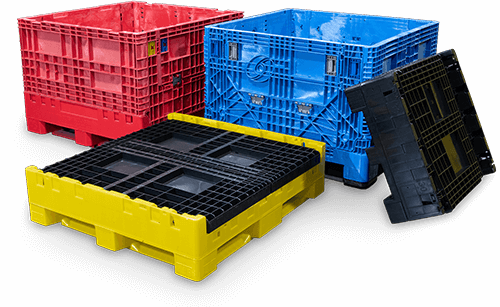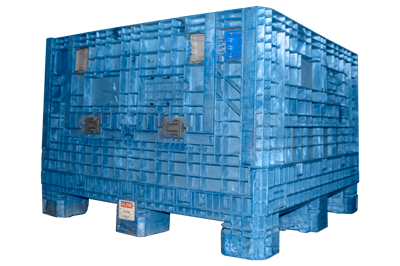Why used bulk containers are efficient for large-scale material management
Wiki Article
Why Mass Containers Are Important for Sustainable and Economical Transport
Bulk containers play an essential duty in contemporary logistics. They facilitate the effective activity of big amounts of goods, therefore optimizing transport procedures. This technique not just minimizes prices however also minimizes environmental effect via reduced discharges and waste generation. As industries seek even more sustainable techniques, the fostering of mass containers is coming to be significantly considerable. What effects does this shift hold for future logistics and supply chain monitoring?
The Advantages of Making Use Of Mass Containers in Logistics
Bulk containers change logistics by improving efficiency and sustainability. These containers permit the transportation of big amounts of items in a solitary journey, significantly minimizing the number of journeys required. This not only improves operations but also lessens labor expenses linked with handling, filling, and unloading. Additionally, bulk containers are made to optimize area application within transport lorries, guaranteeing that even more products can be delivered simultaneously.The standardization of mass containers likewise simplifies the logistics process. With uniform measurements, they can be conveniently stacked and kept, leading to enhanced stockroom management. Furthermore, mass containers usually feature long lasting products that protect contents from damage during transit, thus decreasing item loss and raising general reliability. Therefore, businesses can experience enhanced supply chain efficiency, ultimately leading to enhanced success and customer satisfaction. This combination of factors makes mass containers a critical possession in modern-day logistics.
Ecological Influence: Reducing Waste and Carbon Impact
As markets progressively focus on sustainability, the adoption of bulk containers has actually emerged as a crucial method for reducing waste and decreasing carbon footprints. These containers decrease using packaging materials, such as boxes and plastic, consequently notably lowering overall waste generation. By consolidating deliveries, mass containers boost transportation effectiveness, enabling more items to be delivered per trip. This decrease in trips straight correlates with lower greenhouse gas emissions, adding to a smaller carbon footprint.Bulk containers can typically be recycled or recycled, additionally minimizing ecological impact. The durability of these containers warranties they can hold up against numerous transportation cycles, reducing the need for single-use choices. used collapsible containers. By enhancing logistics and advertising efficient resource use, bulk containers not just sustain sustainable techniques however likewise encourage industries to straighten with international environmental goals. Eventually, their execution shows a commitment to ecological stewardship and accountable resource administration
Expense Cost Savings: Just How Bulk Containers Lower Transport Costs
While several business seek methods to enhance their lower line, the use of mass containers offers a considerable opportunity for decreasing transport expenses. Mass containers make the most of the quantity of items delivered, allowing services to ship bigger quantities at the same time. This efficiency decreases the number of trips required, straight reducing gas prices and decreasing labor costs linked with loading and unloading.Additionally, mass containers often include structured designs that optimize space usage within transportation automobiles. This implies fewer voids, resulting in much more effective use offered ability. The longevity of mass containers can reduce the threat of item damages throughout transportation, decreasing losses and making certain that even more products show up undamaged.
Enhancing Supply Chain Effectiveness With Mass Storage Space Solutions
Bulk storage services play an essential function in enhancing supply chain performance by enhancing inventory management. By settling products into fewer, bigger containers, services can significantly reduce handling costs connected with regular transfers and processing. This structured technique allows for far better monitoring and monitoring of supply, ultimately resulting in boosted functional efficiency.Structured Supply Monitoring
Reliable inventory management is vital for enhancing supply chain procedures, particularly when organizations take on bulk storage space remedies. These options allow businesses to preserve higher stock degrees while minimizing the frequency of replenishment. By settling products into bulk containers, business can simplify their inventory procedures, decreasing the intricacy related to tracking numerous smaller sized packages. This strategy helps with exact inventory counts and boosts forecasting accuracy, enabling even more informed decision-making. On top of that, bulk storage space options simplify stockroom company, making it simpler to find and accessibility items when required. Because of this, organizations can accomplish a more effective supply turn over rate, inevitably enhancing total supply chain efficiency and reducing the chance of stockouts or overstock situations.
Reduced Handling Expenses
The execution of bulk storage space remedies not only enhances inventory monitoring however also substantially minimizes dealing with prices across the supply chain. By consolidating materials into mass containers, companies minimize the requirement for constant handling and transfer in between various storage and transportation units. This approach cuts down on labor costs connected with loading, unloading, and moving smaller packages. Additionally, bulk storage space minimizes the regularity of shipments, resulting in reduced transportation prices and lowered gas consumption. Because of this, businesses can optimize their logistics procedures, allowing for a more reliable allotment of resources. Ultimately, lowered dealing with prices add to enhanced general supply chain efficiency, cultivating an atmosphere that sustains both sustainability and economic stability.
Adaptability of Mass Containers Across Different Industries
Although numerous industries have unique demands for transport and storage space, mass containers have actually become a flexible solution that satisfies a variety of demands. These containers, ranging from huge bins to specialized storage tanks, can suit varied materials, consisting of powders, fluids, and granules. In the agricultural industry, bulk containers assist in the transportation of plant foods and grains, while the food and beverage market uses them for ingredients and ended up products. The chemical sector relies upon mass containers for securely carrying unsafe materials, guaranteeing conformity with security guidelines. In addition, building firms gain from bulk containers for carrying accumulations and various other products. Their flexibility reaches various settings of transport, including vehicles, ships, and trains, enhancing logistical efficiency. This versatility not just simplifies procedures throughout different industries but also advertises sustainability by decreasing packaging waste and optimizing room in transit. Therefore, bulk containers play a necessary duty in contemporary supply chain management.Future Fads in Mass Container Usage and Sustainability
The future of mass container use is significantly shaped by innovative materials growth that enhances sustainability. Additionally, automation in logistics assures to simplify operations, lowering waste and boosting performance. Embracing round economic climate methods will certainly additionally transform exactly how bulk containers are designed, used, and reused, cultivating an extra lasting transportation landscape.Cutting-edge Products Advancement
As markets increasingly prioritize sustainability, ingenious materials development wholesale containers arises as a substantial factor in enhancing environment-friendly transport options. Makers and researchers are checking out eco-friendly plastics, recycled compounds, and lightweight steels to decrease ecological influence. These products not only minimize waste yet additionally improve fuel effectiveness by lowering the overall weight of containers. In addition, improvements in smart products, which can adapt to varying conditions, enhance the longevity and capability of bulk containers. The assimilation of these cutting-edge materials aligns with circular economic situation principles, promoting reuse and recycling. As the demand for sustainable methods grows, the advancement of such products will certainly play an important role in forming the future of mass container usage in logistics and transportation.Automation in Logistics
Substantial innovations in automation are positioned to transform logistics and the utilization of mass containers, boosting sustainability in transportation. Automated systems, consisting of drones and self-governing automobiles, are streamlining the activity of bulk containers, minimizing the dependence on conventional fuel-powered transportation. These innovations optimize routing and packing processes, lessening vacant miles and improving fuel effectiveness. In addition, automated stock administration systems enhance monitoring and tracking of bulk containers, making sure far better resource appropriation and decreased waste. The integration of the Net of Points (IoT) enables real-time information evaluation, allowing aggressive more info decision-making that straightens with sustainability goals. As automation continues to evolve, it is expected to drive even more advancements wholesale container use, ultimately supporting even more lasting logistics methods and lowering the environmental influence of transport.Circular Economic Situation Practices
Innovations in automation are setting the phase for a much more incorporated technique to circular economic situation practices in the domain of bulk container use. As markets increasingly embrace sustainability, mass containers are being made for durability and reusability. This change not only reduces waste yet additionally boosts source performance. Business are embracing approaches such as closed-loop systems, where made use of containers are accumulated, refurbished, and reintroduced into the supply chain. Additionally, smart technologies track container life cycles, assisting in far better management and reducing ecological impact. The partnership between producers, logistics service providers, and end-users is essential in developing standards for lasting container use. used collapsible containers. Future fads indicate an expanding focus on products that are recyclable and eco-friendly, more reinforcing the circular economic climate's concepts in bulk transport
Frequently Asked Concerns
What Materials Are Bulk Containers Generally Made From?
Mass containers are usually constructed from durable products such as high-density polyethylene, aluminum, steel, and cardboard. These materials give toughness, protection, and flexibility, making them ideal for carrying various items in different sectors efficiently.How Do I Select the Right Dimension Bulk Container?
Selecting the appropriate dimension mass container includes evaluating the quantity of materials to be transferred, considering handling equipment compatibility, and appraising storage area needs. Appropriate size warranties effectiveness in transportation and decreases waste throughout shipment.Are Bulk Containers Reusable or Recyclable?
Mass containers are usually reusable, made for multiple journeys, boosting sustainability. Several can also be recycled, depending on the materials used. Choosing recyclable choices additionally supports environmental goals and decreases waste in transportation practices.What Safety And Security Regulations Relate To Mass Container Transportation?
Security regulations for mass container transport consist of conformity with the Division of Transportation guidelines, correct labeling of dangerous products, architectural honesty assessments, and adherence to weight limitations to ensure safe handling and protect against accidents during transportation.Exactly How Can Businesses Shift to Utilizing Mass Containers Efficiently?
Services can transform to bulk containers by evaluating existing logistics, educating team on handling, investing in suitable tools, maximizing stock management, and collaborating with vendors to assure compatibility and performance throughout the supply chain.
As sectors increasingly prioritize sustainability, the fostering of bulk containers has actually emerged as an essential technique for lowering waste and lowering carbon footprints. By consolidating products into bulk containers, business can enhance their inventory procedures, minimizing the complexity associated with tracking multiple smaller sized plans. As industries increasingly prioritize sustainability, innovative materials growth in mass containers arises as a considerable variable in improving eco-friendly transportation remedies. Automated systems, consisting of drones and independent vehicles, are improving the motion of mass containers, decreasing the dependence on conventional fuel-powered transportation. Furthermore, automated inventory monitoring systems boost monitoring and tracking of mass containers, making certain much better resource allotment and minimized waste.
Report this wiki page